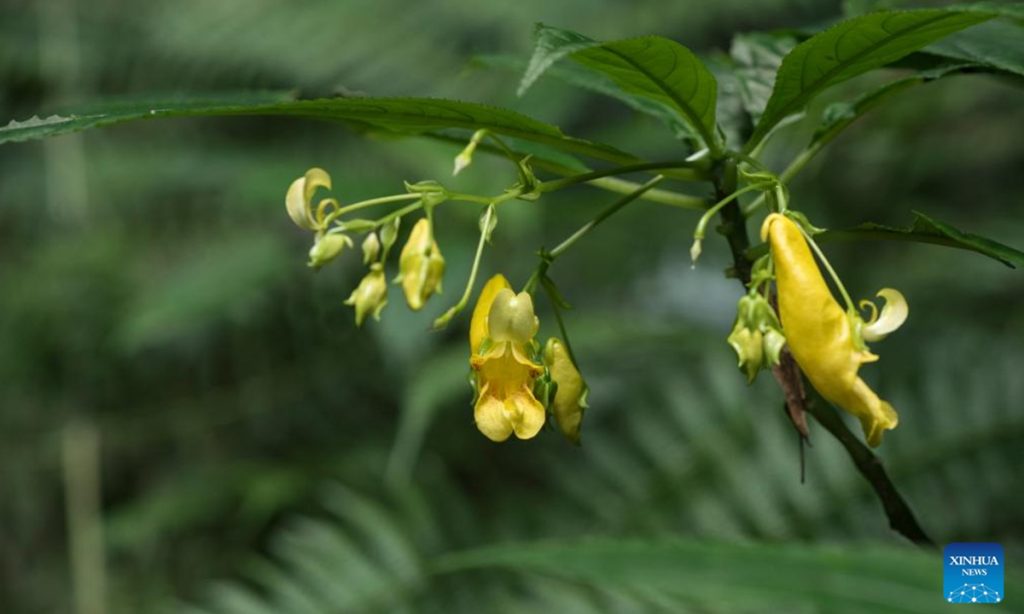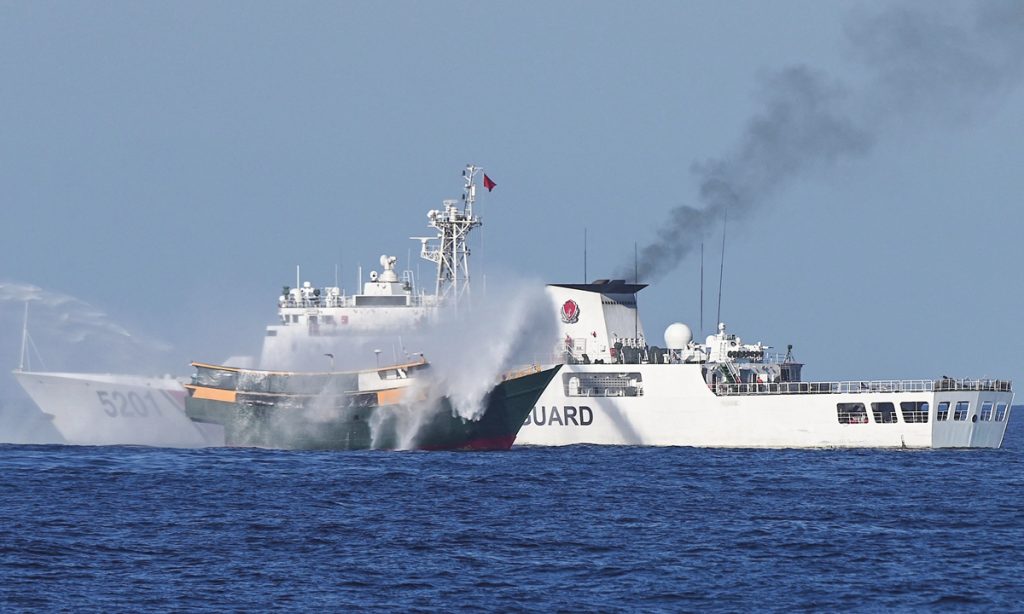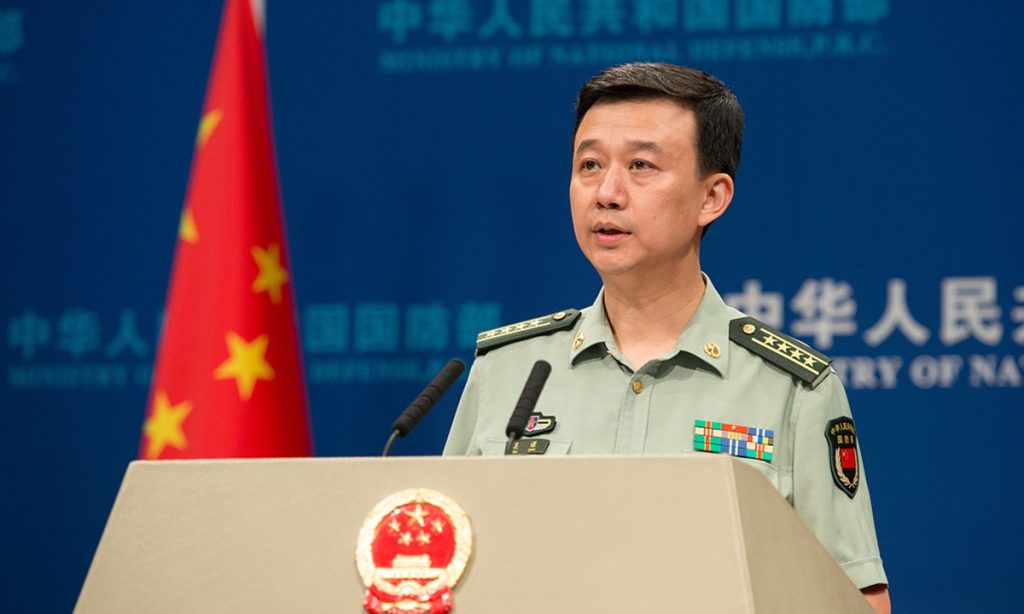Xi, Macron hold talks in Paris
Xi, Macron hold talks in Paris.
Xi, Macron hold talks in Paris.

Chinese researchers have discovered a new species of impatiens in southwest China's Guizhou Province and named it Impatiens beipanjiangensis.
The yellow flowers are described in a paper published in a recent edition of the journal PhytoKeys.
The species is named after the Beipanjiang River Basin in Panzhou City, where a team of botanists first found the specimen in October 2019 during a field survey, said Xu Jian, a member of the team and a researcher with the Guizhou Botanical Garden.
Botanists have so far located about 5,100 plants of the species mostly in the humid valley environment 1,300-1,500 meters above sea level.
The new species, which flowers in October and November, is similar to some other impatiens species in morphology but has significant differences in its sepals, pollen, seed, and other traits, according to researchers.

As the defense chiefs of the US, Australia, Japan and the Philippines are set to meet again in early May in a meeting that is believed to focus on South China Sea issues, Chinese analysts warned on Sunday the quadrilateral clique is unsustainable and bound to show cracks and divisions as their moves will ultimately lead to a deterioration of the Philippines' strategic security environment.
According to Japanese media outlet The Mainichi Shimbun, Japanese Defense Minister Minoru Kihara said Friday he is set to hold a meeting with his counterparts from the US, Australia and the Philippines in Hawaii during his visit from May 2 to 4, citing "China's increasing maritime assertiveness" in the Asia-Pacific region.
It will be the second quadrilateral gathering of those defense ministers since June 2023, when the defense chiefs held a meeting in Singapore on the fringes of the annual Asia Security Conference known as the Shangri-La Dialogue, The Mainichi Shimbun reported.
During his regular Friday press conference, Kihara said they will share their understanding of the regional security environment and common challenges, along with discussing measures to improve collaboration among the four countries.
The US Naval Institute (USNI) News reported on Friday that Kihara and US Secretary of Defense Lloyd Austin, Australian Defense Minister Richard Marles and Philippine Secretary of National Defense Gilberto Teodoro are likely to discuss next steps following the joint patrol in the South China Sea earlier this month.
On April 7, the four countries carried out their first full-scale joint naval exercises in the South China Sea, which analysts said was a highly defiant and aggressive muscle-flexing move against China amid the rising tensions between Beijing and Manila.
Chinese analysts predict that during the upcoming quadrilateral defense talks, the main discussions are likely to cover plans for future joint exercises, training, rotational deployment of troops and short-term deployments in the region, with a focus on the South China Sea.
The US is clearly trying to rally its allies - Japan and Australia - to support the Philippines, encourage the Philippines to engage in more military provocations in the South China Sea, exacerbate the complexity of the regional situation, and then find excuses to strengthen the military presence of the US, Japan and Australia in the South China Sea, Wei Dongxu, a Beijing-based military expert and media commentator, told the Global Times on Sunday.
Wei warned that the involvement of external countries and forces in South China Sea issues will only further complicate the situation in the region, and flaunting their military power will not only affect normal regional cooperation but may also lead to conflicts.
But those provocative moves will ultimately lead to a deterioration of the Philippines' strategic security environment. Once the Philippines realizes this, this military clique is bound to show cracks and divisions, Wei said.
It is believed that the Japanese defense minister will voice a tough message on the issues during his visit to Hawaii.
The Mainichi Shimbun, citing government officials, revealed that Kihara is also arranging bilateral and trilateral talks with Austin and Marles.
Within the framework of the "Indo-Pacific Strategy," the US wants to maximize the use of Japan's military forces as a pawn. Therefore, regarding South China Sea issues, Japan's subsequent military actions will become more proactive, more aggressive and may involve more provocations, Wei believes.
Following in the military footsteps of the US, Japan's flaunting of military power and strengthening of its military presence, especially in the hot spots within the South China Sea, will undoubtedly lead to increased distrust from its neighboring countries, Wei said. He also warned that Japan's expanding military ambitions will further exacerbate the escalation of hot-button issues.

China is concerned about Japan's plan to join AUKUS and firmly opposes relevant countries cobbling together exclusive groupings, building bilateral or multilateral military alliances targeting China, creating division and confrontation and stoking bloc confrontation, a spokesperson from China's Ministry of National Defense (MND) said on Thursday.
The remarks were made by Wu Qian, a spokesperson for the MND, in response to recent reports that Japan has officially announced it will join AUKUS, while Canada's Prime Minister is considering increasing submarine deployments and starting negotiations on joining AUKUS.
Wu said that China is gravely concerned. "We firmly oppose relevant countries cobbling together exclusive groupings, building bilateral or multilateral military alliances targeting China, creating division and confrontation and stoking bloc confrontation. The Asia-Pacific is a big stage for peace and development, not a wrestling ground for geopolitical competition," Wu noted.
China is a cooperation partner for all countries, not a challenge to anyone. Disregarding the concerns of regional countries and the international community, the US, UK and Australia have continuously sent signals of AUKUS expansion, which have severely impacted peace and stability in the Asia Pacific. Many regional countries are deeply concerned about it, said Wu.
Wu also responded to the US revamp of its military command in Japan, a move media said will form better coordination and increased deterrence against China.
Wu said that the US-Japan alliance is a product of the Cold War and a bilateral arrangement that should not target third parties or disrupt regional peace and stability. Japan once took the wrong path of militarism, launching aggressive wars and committing serious crimes against humanity, causing profound disasters in the region and the world. Instead of reflecting seriously on its past actions, Japan is once again showing a dangerous trend of military expansion.
In recent times, the US and Japan have intensified military collusion, promoting camp confrontation and using the unfounded "China threat" rhetoric as an excuse to create targeted "small cliques." This goes against the trend of the times and will only make people see more clearly the harmful intentions of the US-Japan alliance toward regional peace and stability, said the spokesperson.
He said China urges relevant countries to stop creating confrontation and hostility, as it will only increase regional tensions and ultimately backfire on themselves.
China's Chang'e-7 mission has selected six intl payloads to carry onboard, based on scientific objectives and engineering feasibility, from seven countries and intl agencies including Egypt/Bahrain, Italy, Russia, Switzerland, Thailand, and the International Lunar Observatory Association.